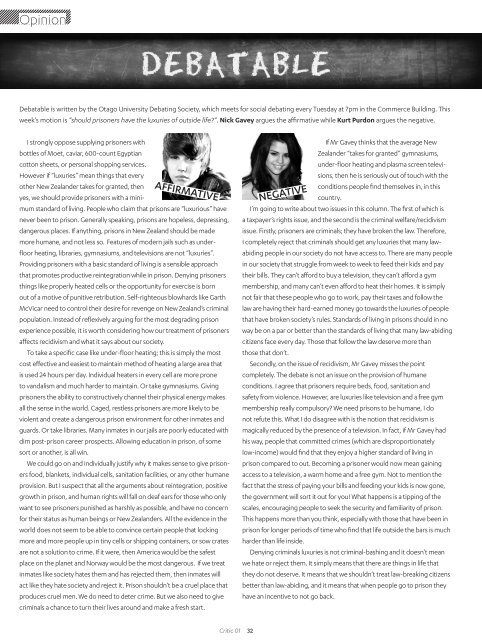BOY - Critic
BOY - Critic
BOY - Critic
You also want an ePaper? Increase the reach of your titles
YUMPU automatically turns print PDFs into web optimized ePapers that Google loves.
Opinion<br />
Debatable is written by the Otago University Debating Society, which meets for social debating every Tuesday at 7pm in the Commerce Building. This<br />
week’s motion is “should prisoners have the luxuries of outside life?”. Nick Gavey argues the affirmative while Kurt Purdon argues the negative.<br />
I strongly oppose supplying prisoners with<br />
bottles of Moet, caviar, 600-count Egyptian<br />
cotton sheets, or personal shopping services.<br />
However if “luxuries” mean things that every<br />
other New Zealander takes for granted, then<br />
yes, we should provide prisoners with a minimum<br />
standard of living. People who claim that prisons are “luxurious” have<br />
never been to prison. Generally speaking, prisons are hopeless, depressing,<br />
dangerous places. If anything, prisons in New Zealand should be made<br />
more humane, and not less so. Features of modern jails such as underfloor<br />
heating, libraries, gymnasiums, and televisions are not “luxuries”.<br />
Providing prisoners with a basic standard of living is a sensible approach<br />
that promotes productive reintegration while in prison. Denying prisoners<br />
things like properly heated cells or the opportunity for exercise is born<br />
out of a motive of punitive retribution. Self-righteous blowhards like Garth<br />
McVicar need to control their desire for revenge on New Zealand’s criminal<br />
population. Instead of reflexively arguing for the most degrading prison<br />
experience possible, it is worth considering how our treatment of prisoners<br />
affects recidivism and what it says about our society.<br />
To take a specific case like under-floor heating; this is simply the most<br />
cost effective and easiest to maintain method of heating a large area that<br />
is used 24 hours per day. Individual heaters in every cell are more prone<br />
to vandalism and much harder to maintain. Or take gymnasiums. Giving<br />
prisoners the ability to constructively channel their physical energy makes<br />
all the sense in the world. Caged, restless prisoners are more likely to be<br />
violent and create a dangerous prison environment for other inmates and<br />
guards. Or take libraries. Many inmates in our jails are poorly educated with<br />
dim post-prison career prospects. Allowing education in prison, of some<br />
sort or another, is all win.<br />
We could go on and individually justify why it makes sense to give prisoners<br />
food, blankets, individual cells, sanitation facilities, or any other humane<br />
provision. But I suspect that all the arguments about reintegration, positive<br />
growth in prison, and human rights will fall on deaf ears for those who only<br />
want to see prisoners punished as harshly as possible, and have no concern<br />
for their status as human beings or New Zealanders. All the evidence in the<br />
world does not seem to be able to convince certain people that locking<br />
more and more people up in tiny cells or shipping containers, or sow crates<br />
are not a solution to crime. If it were, then America would be the safest<br />
place on the planet and Norway would be the most dangerous. If we treat<br />
inmates like society hates them and has rejected them, then inmates will<br />
act like they hate society and reject it. Prison shouldn’t be a cruel place that<br />
produces cruel men. We do need to deter crime. But we also need to give<br />
criminals a chance to turn their lives around and make a fresh start.<br />
AFFIRMATIVE<br />
<strong>Critic</strong> 01 32<br />
If Mr Gavey thinks that the average New<br />
Zealander “takes for granted” gymnasiums,<br />
under-floor heating and plasma screen televisions,<br />
then he is seriously out of touch with the<br />
conditions people find themselves in, in this<br />
country.<br />
I’m going to write about two issues in this column. The first of which is<br />
a taxpayer’s rights issue, and the second is the criminal welfare/recidivism<br />
issue. Firstly, prisoners are criminals; they have broken the law. Therefore,<br />
I completely reject that criminals should get any luxuries that many lawabiding<br />
people in our society do not have access to. There are many people<br />
in our society that struggle from week to week to feed their kids and pay<br />
their bills. They can’t afford to buy a television, they can’t afford a gym<br />
membership, and many can’t even afford to heat their homes. It is simply<br />
not fair that these people who go to work, pay their taxes and follow the<br />
law are having their hard-earned money go towards the luxuries of people<br />
that have broken society’s rules. Standards of living in prisons should in no<br />
way be on a par or better than the standards of living that many law-abiding<br />
citizens face every day. Those that follow the law deserve more than<br />
those that don’t.<br />
Secondly, on the issue of recidivism, Mr Gavey misses the point<br />
completely. The debate is not an issue on the provision of humane<br />
conditions. I agree that prisoners require beds, food, sanitation and<br />
safety from violence. However, are luxuries like television and a free gym<br />
membership really compulsory? We need prisons to be humane, I do<br />
not refute this. What I do disagree with is the notion that recidivism is<br />
magically reduced by the presence of a television. In fact, if Mr Gavey had<br />
his way, people that committed crimes (which are disproportionately<br />
low-income) would find that they enjoy a higher standard of living in<br />
prison compared to out. Becoming a prisoner would now mean gaining<br />
access to a television, a warm home and a free gym. Not to mention the<br />
fact that the stress of paying your bills and feeding your kids is now gone,<br />
the government will sort it out for you! What happens is a tipping of the<br />
scales, encouraging people to seek the security and familiarity of prison.<br />
This happens more than you think, especially with those that have been in<br />
prison for longer periods of time who find that life outside the bars is much<br />
harder than life inside.<br />
Denying criminals luxuries is not criminal-bashing and it doesn’t mean<br />
we hate or reject them. It simply means that there are things in life that<br />
they do not deserve. It means that we shouldn’t treat law-breaking citizens<br />
better than law-abiding, and it means that when people go to prison they<br />
have an incentive to not go back.<br />
NEGATIVE














